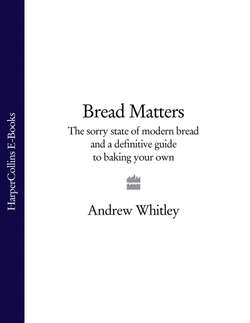Читать книгу Bread Matters: The sorry state of modern bread and a definitive guide to baking your own - Andrew Whitley - Страница 21
Freshness
ОглавлениеTraditional bakers know that the longer you ferment your dough, the better the bread keeps. Time invested in the making is repaid in the eating. Modern bakers and retailers have destroyed this elegant balance. They have stolen time from the production process, a theft they try to disguise in contradictory ways. In the case of standard sliced and wrapped bread, they use additives to keep the crumb soft (or ‘fresh’, as they would say) for a week or more. With the unwrapped bread, on the other hand, time is distorted in a rather different way.
Supermarkets and their industrial bakery suppliers have robbed ‘freshness’ of all meaning. One loaf, unwrapped and apparently ‘freshly’ baked on the premises, has in fact been made and probably baked elsewhere days or weeks before. Another loaf, baked elsewhere, has been laced with undeclared and unspecified enzymes – a kind of baking Botox – so that its soft, cloying texture remains in an unchanging caricature of freshness, day after depressing day.
To reclaim freshness – word and concept – from the self-serving interests that have hijacked it, two things are necessary: to agree a definition of ‘fresh’ that accords with the best evidence of our senses, and to conquer the unnecessary fear of what happens as freshness wanes. In the case of bread, ‘fresh’ can surely mean only one thing – recently baked (for the first and only time). I have some ideas about enjoying bread as it ages in the final chapter of this book.
So modern baking is schizophrenic about time, now wanting to reduce it to nothing, now trying to extend it indefinitely. And it is also in two minds about its raw materials, torn between the desire to remove things that get in the way and the impulse to add things that will make the bread easier (for machine production), bigger, softer, cheaper, longer lasting or more apparently healthy. Baking technologists just can’t leave well alone. There’s always some functional advantage to be pursued, some marginal value to be prised from dumb nature, as if the human race had never quite mastered this business of bread.
We have evolved an industrial breadmaking system that, in a variety of ways we can no longer ignore, produces bread that more and more people cannot and should not eat. Some would say that the pappy texture and bland flavour of Chorleywood Process bread are reason enough to consign it to the compost heap of food history. However, these qualities are ultimately matters of personal preference. The use of additives, on the other hand, especially those whose provenance or purpose is not apparent to the consumer, raises serious questions of accountability and trust. Above all, the baking industry must respond to the growing body of research that is charting the profound unhealthiness of making bread quickly.
From wheat to finished loaf, industrial baking needs to be reconstructed from first principles, of which the most important is a proper respect for time.
